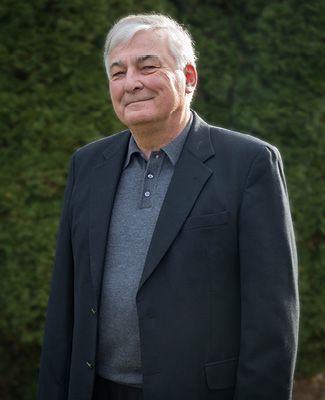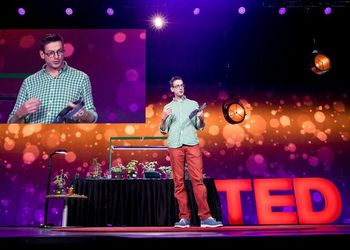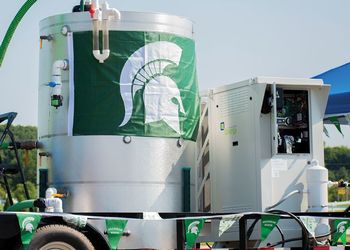The Power of Efficiency

The Power of Efficiency
As a refugee and U.S. Air Force veteran, energy innovator Vytau Virskus, ’75, channels his life experiences into pioneering new methods of conserving energy.
November 17, 2023Born in a displaced persons camp in Tübingen, Germany, in 1947, as his family escaped the Soviet occupation of Lithuania, Vytau Virskus arrived in the United States still a young boy.
His experience as a refugee forged his approach to life and work from the beginning: “Work hard, do the best you can with what you have and try to improve everything that you possibly can improve,” he says. “It’s the ethic I inherited from my father and mother and grandfather.” It’s a worthy credo for his work as founder and CEO of Millenium Energy Company, a firm that analyzes the energy use of clients typically municipalities—and finds efficiencies to save energy and money.
Virskus began studying mathematics at MSU as an undergraduate, but was drafted into the U.S. Air Force in 1968, where he served as a crew chief on a C-130 cargo plane in charge of flights over Vietnam and elsewhere in the Pacific. The experience was galvanizing, and Virskus found supervising complex missions compelling. “It was a very significant management job, making sure our crews would come back safely,” he says. “I took it very seriously.” When he returned from the war, he switched his focus from the more abstract realm of mathematics to engineering.
Soon after graduating, Virskus started his career right here at Michigan State. In the midst of the mid-1970s energy crisis and oil embargo, MSU took action to increase energy efficiency university-wide. Virskus was selected to lead a team in that effort. He and his colleagues began with low-hanging fruit, building an automated computer system to control energy use in the facilities.
“Some of the buildings were running 24 hours a day, seven days a week, but there were times when there was no one in the building,” he recalls.
Virskus quickly started seeking more innovative ways to preserve energy on campus. One method involved loading a sophisticated infrared video camera onto a Cessna aircraft and flying it over campus buildings to find heat loss. “In order to operate the camera, we needed liquid nitrogen to cool the sensor, which we got from a connection in the cyclotron laboratory,” says Virskus. “That was a brand new method to detect heat loss.”
That kind of creative thinking has been a hallmark of his career. In a recent project in Dearborn, Michigan, Virskus realized energy savings of almost 50% for the City of Dearborn’s 80-acre building complex. The cooling system burned scores of energy by pumping a massive amount of fluid to keep pressure consistent and in accord with best practices. Virskus flipped the script. Rather than focusing on the system priorities, he discovered he could achieve adequate cooling by simply doing less. Virskus radically streamlined the system using an algorithmic tool called E-Flow, a patented flow meter he created in collaboration with his former teacher, MSU Professor Emeritus John Foss.
“We saved 40% of the pumping capacity and $870,000 in energy costs overall,” Virskus reports. His work won Project of the Year plaudits from both the Region III Association for Energy Engineers and the Michigan Chapter of the American Public Works Association.
Virskus and his wife, Cathy, still live near campus and have three adult children—Joe, an AI programmer, Jason, an environmental engineer and Jenn, a writer who also created and coached Lithuania’s Olympic alpine ski team.
“Growing up, the kids would bike to campus and go to football and basketball games,” Virskus recounts. “We’re all still dyed-in-the-wool Spartans.”
Contributing Writer(s): Chris Quirk




